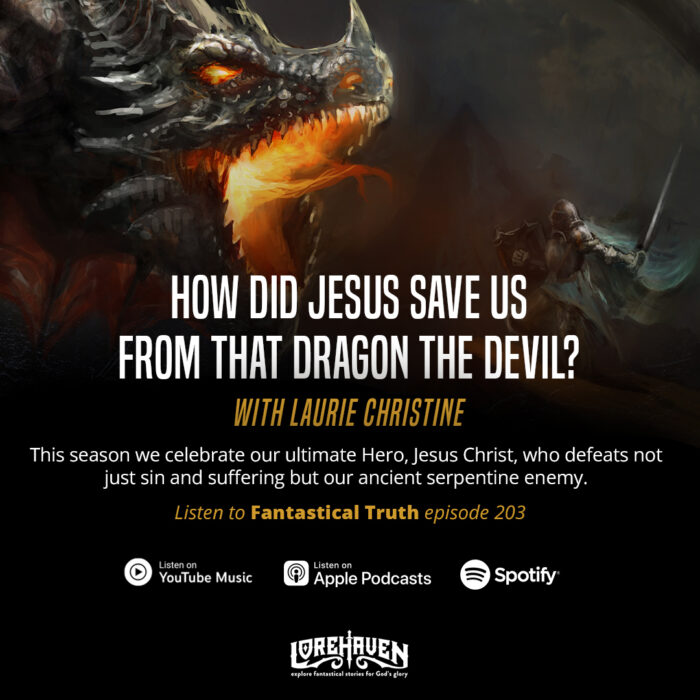The Christian And Stories
 Realism, truth, beauty, message, God-glorifying, entertaining. Spec Faith has examined and re-examined these various aspects and purposes for writing and reading stories, and yet we are confronted, as we were these past two weeks in our guest posts, by a book like A Throne of Bones by Vox Day and an imprint like Hinterlands by a Christian publisher like Marcher Lord Press, and the old question re-surfaces: what are Christians doing when we read and write stories? What should we be doing?
Realism, truth, beauty, message, God-glorifying, entertaining. Spec Faith has examined and re-examined these various aspects and purposes for writing and reading stories, and yet we are confronted, as we were these past two weeks in our guest posts, by a book like A Throne of Bones by Vox Day and an imprint like Hinterlands by a Christian publisher like Marcher Lord Press, and the old question re-surfaces: what are Christians doing when we read and write stories? What should we be doing?
Unsurprisingly, we are, in part, a product of our culture, so what we understand about story today has been influenced by postmodern thought. Consequently, it’s easy to discount or downplay “message” in a story and to emphasize the need for artistic value–from which a great deal of the push for realism comes.
Art is more important than message because the latter essentially declares that there is an absolute for everyone–something incongruent with postmodern thought. On the other hand, art is about beauty and truth–beauty being in the eye of the beholder and truth, determined by what is true for each individual.
The postmodern view of story, then, seems to downplay the idea that writers can and should communicate what they believe through the intertwining of a plot, characters, and a storyworld. Rather, stories, while being necessarily gritty to show the real world, should at the same time be purposefully ambiguous so readers can reach their own conclusions.
Of course this view of story has merits. Educators tell us that true learning takes place when a student appropriates knowledge for himself instead of simply interacting with facts on an intellectual level. Stories that make a difference, then, would seem to be the ones that do not draw a nice, neat conclusion: therefore, because our hero gave his life to Christ, you also should go and do likewise [overt conclusion]; or even our hero became a Christian and now he’s happier than any time in his life because things are going so well [implied conclusion].
The large elephant postmodernism ignores, however, is Truth–not the relativistic kind that shifts from person to person, but the absolute kind that doesn’t require anyone to believe it because it remains no matter what. The belief in absolute truth, we’re told, is the cause of religious fanaticism and intolerance–and this the postmodern thinker believes absolutely!
 The fact is, absolute truth supersedes cultures and individuals and theories and philosophies. And guess what. Story does too. Jesus demonstrated this clearly in the parables He told. His stories spoke to first century Jews living in Judea but also to twenty-first century Gentiles living in Taiwan or Kenya or France or Mexico or Australia. His stories resonate with children in Sunday school or adults in Bible study. His stories make people laugh and cry and sit up, amazed, but they also prompt people to go and sin no more.
The fact is, absolute truth supersedes cultures and individuals and theories and philosophies. And guess what. Story does too. Jesus demonstrated this clearly in the parables He told. His stories spoke to first century Jews living in Judea but also to twenty-first century Gentiles living in Taiwan or Kenya or France or Mexico or Australia. His stories resonate with children in Sunday school or adults in Bible study. His stories make people laugh and cry and sit up, amazed, but they also prompt people to go and sin no more.
Consequently, many people have pointed to Jesus’s use of stories as an example for writers today, and I concur. When various people asked Jesus a question (IE, “Who is my neighbor?”) He answered by telling a story. Unlike postmodernism stories, however, His were never pointless nor were they caught up needlessly with gritty details. “A man fell among thieves” did not become a litany of the battering he took or the curses his assailants uttered as they attacked him.
So by looking at Jesus, what can we conclude Christians should be doing in regard to reading and writing stories?
One group advocates the approach of the apostle Paul in Athens, using Greek poetry and their religious system to make a case for Christ. Are we to win some by being all things to all people?
Should we seek to win the hard drinking and hard swearing jock by writing stories filled with drinking and swearing? Since real people do drink and swear and assault people and have affairs, since real people are prostitutes or frauds or terrorists, shouldn’t our stories show them in all their ugliness and need–without, of course, delivering a message of change or redemption since that would be unrealistic and preachy.
Others answer this approach as LukeLC did in a comment to “Marcher Lord Press And The Hinterlands Imprint“:
if the world could be won with the world’s ways, it would have won itself to Christianity long ago. What you win people with is what you win them to. If you attempt to win the unsaved to an appreciation of Christianity because, hey, we have Christian novels with all the same stuff as non-Christian novels…but different, all you’ll end up doing is proving to the unsaved that they’ve got no need for Christianity.
 I suggest we Christians have gotten bogged down because we have focused on the meta-story, the overarching story of Mankind’s fall and God’s redemption through the death and resurrection of His Son. It seems as if we all want to be seed sowers when in fact some of us should be soil tillers or weed diggers or scarecrow makers or rock removers. Perhaps, for example, we should tell stories illustrating the existence of absolute truth so that readers will be alert and open to hearing about the One who is Truth. In other words, perhaps we should be more focused on telling micro-stories that address the issues that make belief in the meta-story difficult. This, rather than a focus on “realism,” seems to me to address readers across generations and cultures.
I suggest we Christians have gotten bogged down because we have focused on the meta-story, the overarching story of Mankind’s fall and God’s redemption through the death and resurrection of His Son. It seems as if we all want to be seed sowers when in fact some of us should be soil tillers or weed diggers or scarecrow makers or rock removers. Perhaps, for example, we should tell stories illustrating the existence of absolute truth so that readers will be alert and open to hearing about the One who is Truth. In other words, perhaps we should be more focused on telling micro-stories that address the issues that make belief in the meta-story difficult. This, rather than a focus on “realism,” seems to me to address readers across generations and cultures.






































I have a question. Where in the wide world did the idea that you can save a person by writing a book come from?
98% of the time people are not drawn to Christ through a fictional story.
I am exempting, of course, the Bible from this as it’s not fiction, nor was it written by man.
I would really like to know where the idea came from that you can save a soul by writing a book.
You can’t. I write. I love books. I read books. I work in the Christian book industry.
There are maybe twenty books that have changed how I live, and I think possibly three were fiction. No more than five.
People are stubborn, and the unsaved are unrepentant. Books are not going to change them.
Every once in a great while, you’ll find someone came to Christ because of fiction. But if you scratch the surface of their testimony, you’ll find so many other elements at work that it is definitely not the book ALONE that brought them to Him.
I would suggest, with respect, that we Christian writers STOP TRYING TO SHARE THE GOSPEL through the books and just write phenomenally good stories.
If the story needs the violence in there to make it better–put it in there.
If the story needs cursing in there to make it better–put it in there.
If the story needs carnality in there to make the story better–put it in there.
Put in the desperate last hopes
Put in the sacrificial characters
Pour in love
Ground your story in a moral center (like Lewis and Tolkien)
Tell your story and make it the very best you can. And then get an editor to make it even better.
Write a great story.
Good stories will make readers curious about their writer. Great stories will make the curious reader find out everything they can about the writer. And a writer not the book they’ve created, has a chance, to win a soul.
Hi, Michelle, thanks for your comment. You actually are taking a slightly different tangent, but not so far removed, from my conclusion. While novels can reinforce or bring to bear God’s truth about sin and salvation, they certainly are not “what saves a person.” The Holy Spirit does that. He uses all kinds of means–preaching, conversation, Scripture, heartaches, visions, and sometimes books. But as you point out, it’s not something we hear about frequently that a person repents of their sin after reading a novel.
What I suggest, however, is that writing a great story requires an author to have something to say. If we don’t have a point, then you’ve reached the apex of banality.
I think Christians have so often written about salvation in large part because it is the singular most important aspect of life here and hereafter–it’s the larger-than-life plot point. It is the issue that determines a person’s eternal destiny. You can’t get bigger stakes. Hence, it’s become sort of the default point for Christian novels, and as such has become less thought-provoking, less important, and abundantly predictable.
My conclusion, in essence, is a challenge to writers to tackle some of the beliefs in our culture that make the salvation message seem so foreign to a large part of our society. I mentioned the belief in absolute truth as an example. To a culture that does not believe in absolute truth, saying that Jesus is the only way to God sounds dogmatic, arrogant, intolerant. So, before we say Jesus is the only way, perhaps we need to write a story that shows that absolute truth does exist.
Or how about forgiveness as a way of life rather than revenge? How about challenging the concept that Man is good? Or the idea that we deserve comfort and ease, which makes us so angry when suffering and hardship come. I could go on, but I think you get the idea. There are a host of things our culture has learned–often from stories we watch–that Christian fiction can counter.
That’s what it means to write a great story. It not only has characters with whom we connect and a plot that keeps us on the edge of our seat, but in the end, it makes the reader think, perhaps challenges or perhaps reinforces beliefs. It isn’t some vapid, just-for-fun fluff.
Becky
Agreed, we can only strive to writing an influence among many influences that God can place in people’s lives. People identify with characters with real problems and issues with even a villain that repents. Getting anyone to think about a faith journey is important. I have a friend who converted after many years simply because she saw problems being addressed through faith in my wife and I – not because we were cardboard cut-outs of Christians with all the answers. Why should my writing have all the answer? Instead it should point to THE ANSWER.
I think Diana Wynne Jones touched on this same concept when she talked about a “blueprint”.
Based on Michelle’s comments, I say this goes back to the prime question:
What is the chief end of story?
But I suggest the chief end of a story is not “to share the Gospel” (in the minimalist way most people understand this to be saying), or simply to be “a really good story.” The best really good stories have something to say, a something beyond themselves.
No, Christians don’t do “art for the sake of art.” We do it for God’s sake.
Ergo: the chief end of story is to glorify God and help us enjoy Him forever.
If people can’t get past understanding that as repeating come-to-salvation tropes, or insist that “glorify God” must mean overt religious language — and so therefore, they insist, we needn’t worry about all that “glorify God” stuff — the issue here is poor theology and a low view of God our self-revealing Creator, the absolute Source of all truth and beauty.
As the hymn “This is My Father’s World” says, “He shines in all that’s fair.”
i agree. I just read a child’s fantasy novel written by a 12 year old who published on kindle. The main plot of the story was following after God or following after flesh? What a great message!!! We can write novels that portrays God’s grace, strength or even the simple gospel. I personally think it’s silly to go around and around arguing about whether or not we reach the lost. I write what God tells me to write and He does the rest. If it touches a heart, then so be it. If someone finds it entertaining, then so be it. It’s in His hands and His hands only.
Did you have any definition in mind for “postmodern thinker”? Are you specifically referring to postermodern schools of formal philosophy, so that a “postmodern thinker” is a scholar or at least a quasi-educated layman deliberately trying to subvert traditional Western thought? Or are you simply referring to anyone whose thinking is influenced by the postmodern culture? I think this is a very important distinction.
C.S. Lewis wrote as if his own modernist culture was already anti-Christian. He was an apostle to his culture because he was able to speak in modernist terms.
Excellent. There is another one of the great and meaningful statements I’ve come across on this website.
Bainspal, I wasn’t intending “postmodern thinker” to refer to a professional philosopher but rather to the person who thinks postmodern-ly. It is such a surprise to me that people can say absolutely that there is no absolute truth, but it’s because no one is pointing out to them that they are declaring something to be an absolute truth in their very dismissal of absolute truth.
And where are our stories dealing with this subject? The everyday person didn’t get their ideas about relativism from reading philosophy books, I suspect. It’s a steady diet of story–the postmodern preference for disseminating information. And Christians need to present God’s view on these matters instead of rushing past them as if they don’t matter. They matter a great deal because of how they color our culture’s response to the claims of Christ.
Thanks for your encouraging comment about content here at Spec Faith. I for one find a great deal of material to think about right here in these comments. You all make Spec Faith work. 😀
Becky
As it has been said before “Fiction is a lie through which we tell the truth.”
The truth is, no one in our world is perfect. No, not one. And while Chesterton hit the nail on the head “You may have a story of a boy among dragons, but not one of dragons among dragons” he also wrote exceedingly well, and not just for the lost or for the saved but for everyone. He saw no difference between a Christian reader and Non-Christian reader. He saw intelligent interested people who longed to read great stories.
Christians used to write classics. Tolstoy, Stevenson, Bronte. What has happened that we don’t write classics any more?
Christians have bought into the idea that you can write Gospel stories and people will be saved. And our storytelling has suffered.
I work as a reviewer for an independent site, and I am now moving from the Christian fiction to Secular fiction because I can not stomach the banality of Christian writing any more.
If you want to be taken seriously, if you want to transmit ideas, you have got to write well. You can do that with moral themes and Christian characters if you like, but write also well rounded non-Christian characters that love and hate and sacrifice.
I’m so fed up with Christian writers clawing and gnashing and slashing at one another.
If you want to write stories that have moral themes in them with violence and loss and sex an language then DO so, but do so for the greater glory of God. He’s no stranger to any of those things. He abhors sin, but He doesn’t hide it. We have no lily white heroes in the Bible save One.
If you want to write stories that have the Gospel blatantly marching through it then do so but spin a tale of sacrifice and life and loss and sin and wrong too. Do not keep churning out these stomach sickening watered down buckets of tripe that are not worth the paper they’re printed on. That does not honor Christ. They make Him an anemic Savior of a too-good people.
If some want to go as Peter to the Believers to edify and build up their faith through stories–then go. But stop slashing and hacking and deriding and vilifying those that go as Paul to the Greeks.
Along with missions altogether. People forget that God, not people, saves people. He uses means. Against that many Christians, with good intentions, have substituted a kind of pyramid-scheme. Let’s save people so we can save people, and so on, down the multilevel megachurch marketing complex. We forget that people are saved for a purpose beyond simply more faith-sharing evangelism. It’s to glorify God and enjoy Him forever. This includes evangelism, but also everything we do.
But I must oppose efforts and slogans (though I haven’t seen them here) that say or imply that Christian novels should be something less than evangelism. Wrong. They should be more than evangelism. That means all the things Becky mentioned.
Michelle, even then I’m sure you’ll find banal writing — but perhaps less of it simply because there is more “secular” fiction available. That increases the odds of good authors being discovered and promoted. In this I don’t mean, however, to denigrate the issues of bad theology leading to bad Christian writing. (One of those examples is some Christian authors’ and novels’ overt exaltation of naive, “blind faith” baby-Christian characters, as if they are the pinnacle of spiritual achievement.)
Which we try not to do here, first because of our emphasis on readers, second because we want to emphasize Biblical truth rather than merely “a pox on all those legalistic publishers and Christian-bookstore patrons.” There’s no joy in that.
Furthermore, Biblical truth stresses peacemaking, even against the Shallow Ones.
I appreciate this better argument for including more of such material. Lately the loudest arguments are of the “let’s impress pagan readers” and “let’s be just like them” and “let’s stick it to those legalists” variety. There’s no joy in those either.
Another way to say it is how I finally managed to condense it for a Tweet: the greatest risk of banning Bad Words [or violence or other representations of sin] from fiction is that it implies the Gospel only works in a pre-cleaned world. That makes it a Biblical/Gospel issue, not an impress-pagans/”art” issue.
We need a good speculative-readers-mindful exposition of Acts 17, likely for a feature around here. I’ve been considering such a feature for some time. There are un-Biblical myths about it, but also plenty of things Christians often ignore.
Michelle, I don’t see a point of disagreement about writing good stories. I think we might have some differing views on what makes a story good, however. Often people who think Christian fiction isn’t very good clamor for “realism,” but by that they mean a realistic depiction of the sin in this world. At the same time they don’t care for a realistic depiction of what God is doing in and through the lives of His people. Those things get labeled as “preachy.” The miraculous is too often declared to be unbelievable or a poor writer technique that allows God to step in at the last minute to save the day.
Personally, I think it’s a challenge to write stories that are as spiritually realistic as they are physically realistic. C. S. Lewis was the master of this, in my opinion. Not only did he make Narnia live but also Perelandra and the gray town and Oruel’s city, all without declaring his intent to show spiritual reality. Yet, show spiritual reality he did, masterfully so.
Should we Christians work harder to create stories that are True–as much so about the way God works in the world as about the way Man lives? I think we should. If we take up the challenge to be realistic in more than a three-dimensional plane, it’s going to be hard work. But I don’t see that hard work is a reason to step away from aiming high.
As for writers “clawing and gnashing and slashing at one another,” I have to say, I’m one who enjoys debate. However, if something I said in this post came across as clawing and gnashing and slashing, I’m very sorry. That is not my intent. Rather, I’d hoped to write something that might stimulate us to love and good works–to write better and to read better.
Becky
I would agree that if we are being “gritty” and “realistic” for the sake of saying, “Look at us, we have the same thing, only Christian!” would be a wrong reason and a wrong message to send. And undoubtedly, some have done just that by including such “realism” merely for the sake of being realistic, but not needed for the story.
But I also consider that different than what St. Paul did at Athens. He started where they were at, but *moved* the *message* toward God. He didn’t leave them with the impression that Christianity endorsed idol worship. Quite the opposite, in fact. He clearly proclaimed the Gospel. So much so, that he lost most of his audience when he came to the point of Jesus rising from the dead.
Starting with where people are at and being realistic enough that they can identify with the characters and not break the suspension of disbelief, but moving them to transform their situation through vicariously living it through another character can be both transformative for the individual and glorifying God, and not the sin. As I’ve said before, what makes a story Christian isn’t where it starts, but where it ends up at.
But I agree, putting in cussing and other sin into your story merely to be read and accepted by the “unsaved” crowd as if that was all fine and dandy, we can be friends, is the wrong message to send. If it is to counteract Truth, then it isn’t Christian. You quoted the verse by St. Paul, “Be all things to all people…” but many forget why that is done, in order that, “…by all means we might save some.” Not to be accepted.
But I think some, not being discerning, think anyone who includes cussing or the fact that someone is having sex is always doing the wrong motive, and the other outcome is never considered to be valid that could not only be used to glorify God’s and His grace, but move someone closer to God. And as you know, I agree with the idea that every story shouldn’t try to do everything. Sometimes you need stories that plow the ground to move someone closer to God. And plowing sometimes means stabbing it into the hard ground and applying pressure.
Rick, you helped clarify something for me. I agree that the Apostle Paul’s method was effective, but I realize that many people who use him as an example for writers are focused on the externals–he used an idol altar, he quoted Greek poetry. The real point is, he started with their belief system and showed them how wrong it was. My pastor happened to address this on Sunday. When Paul said the following, he was challenging their religious framework.
He declared God to be over their gods, and their temples to be insignificant. The point is, his approach wasn’t so much about the externals, but about the things they would have considered the default position, their “given” (there are many gods and we have to work to keep them all appeased).
That’s what I think is missing in Christian fiction today. We aren’t challenging the thinking of our culture as much as we are the moral behavior (and that, not very well). The best we do, in my opinion, is present Christ, but as I mentioned earlier, the truth we present falls on deaf ears, in part because we’re giving an answer to a question our culture isn’t prepared to ask. We’re telling them Christ will save them from their sins, and they don’t think they have sins. We tell them Christ will give them life eternal and they think there is no life eternal. We tell them Christ is the Way to reconciliation with God and they think god is within each of them.
Anyway, thanks for adding to this discussion. Good thoughts.
Becky
Becky, you said:
Spot on. One of my goals in “plowing” has been to challenge assumptions and preconceived ideas about God and how He works. I just published a devotional, and one memory I put in there was a friend of mine back in the 80s said, “My God doesn’t operate that way.” I thought, but didn’t say it, “Maybe your God doesn’t, but what about God?”
I think both Christians and non-Christians need to see and experience a different perspective, a fresh look, and that is something speculative fiction excels at doing. I feel like I’ve done my job as an author if when one of my stories has been read, the reader has a sense of seeing something from a new viewpoint that makes them think. Broadens their experience.
As you may know, the Reality Series of mine is an attempt to do just that.
I think what’s being left out in this discussion about realism in Christian fiction is that, while we do have a need to show realism in aspects of life such as violence, profanity and the like, we also have to show realism when it comes to Christians. In real life, Christian believers pray, sing hymns, go to church, and talk about Christ and the Gospel — out loud. So if I read a Christian novel in which no one talks about Christ or salvation, I’m left scratching my head and saying, “What makes it Christian?” Themes of sacrifice and repentence are all well and good, but if the reader doesn’t know that the reason that character is giving his life to protect others is because he believes in Christ, then why bother calling it Christianity? You could just call it I’m-A-Good-Person-Who-Will-Die-To-Rescue-Another-ianity.
For my part, I decided a long time ago that as much as I can help it, I never want to speak in “Evangelicalese” again. Can someone be a real Christian without casually talking about “saved”? We do so much injustice to the truths of Scripture by using Christian terminology as casual jargon. Jargon inevitably makes a shallow straw-men out of the true meaning behind the ideas contained in the words. Many Evangelicals are quick to point out the legalistic dogma in Catholicism and the like but fail to realize that Evangelical clichés have also become dogma. I prefer “born again” to “saved,” but that term has been abused too. It is Christ who saves, not semantics.
I love my church, even though they talk about being “saved” and “witnessing” and all the other jargon. I don’t have a grudge against any Christian leaders or groups. I blame my years of struggling over the conception of salvation only on Evangelicalism as a loosely-defined concept. As a Christian, I am offended by Evangelical jargon and clichés. I can imagine how much more unbelievers and people who have really been hurt by hypocritical believers must hate “Evangelicalese”!
I agree, Steve. Very few Christians act the way I see Christians act in real life. I read a novel just recently in which a secondary character, raised in a Christian home, couldn’t give a simple answer to a person asking questions about her faith. She basically said, I guess I believe because that’s the way my parents taught me to believe.
Sure, that’s true also, but where is the person who believes because they’ve been radically changed, inside out?
Becky
I think that if the reason is to win others by being “gritty”, that as wrong. However, I also think that much of Christian fiction really is just “preaching to the choir” if you will. We present people as either too nice to an unrealistic level, having all things work out too well, or we are quite ridiculous in our presentations of evil. You could seriously have (I’ve read them) stories where the Big Bad runs an international sex slavery ring, but is a gentleman language-wise, who never swears. Um, what?!
I’ll be honest in saying that I have sniggered at times in how unrealistic some authors are, and I agree with their viewpoints, I can clearly see how those who don’t agree probably will just chuck the book. Also, while I agree that we should just focus on telling good stories, we also can not change the fact that stories are written by people with viewpoints that inevitably seep into the tale. Being sure those viewpoints come out right is a concern. I mean, how do you explain that unintended, but still obvious, Christian concepts in the Star Wars films?
My final point is that I think we worry too much about swearing, sex, and violence (too much because these are concerns if taken too far) than we do about the moral code we teach in our tales. We seem to think that as long as we have no swearing, sex, and very little violence, we are fine, even if the characters’ ethics are such that in real life they’d be rather horrifying. Oh sure, watch them laugh in delight while they chop the bad guy’s head off, they did it for God, so such blood-thirsty conduct and sadism is not at all bad. Right? Really, we pay far too much attention to superficial problems and ignore the actual beliefs and morals we teach. This is a problem for me.
Timothy, I’m with you. This focus on putting sex and profanity or vulgarity in our stories is such a minor point. It ought not be the focus of our writing discussions, in my opinion.
Scripture tells us about a woman caught in adultery, about Peter swearing he didn’t know Jesus, about Paul stoned and left for dead, but at no time are the “eye-witness” details the point. I think we’re making them the point today, and we don’t have to. Instead we should be addressing what’s in people’s hearts and minds, not whether we get to write the salacious specifics.
Becky
I enjoyed reading your comment on this topic. You seem to express concern over where the “keep it clean” line of Christian writing ends and where the “gritty” line of secular writing begins. I have been back and forth on the issue, and have rejected some novels because a character uses the Lord’s name in vain. Some may think that’s ridiculous (or legalistic), but I prefer to read stories (secular or Christian) when an author doesn’t feel that is needed to advance a story.
You stated that we are worrying too much about swearing, sex, and violence rather than the moral code we teach. My argument is that the swearing, sex, and violence make up the moral code; there is no separation.
I continue having this discussion with myself as I edit my novel. 🙂
Ak, I too don’t care to read stories with a lot of cussing. I can handle one here and there, but all the time turns me off. I think that is in part because in my life, I don’t hear people talking that way much. Sure, I’ve run into people who do use a cuss word in every sentence, but those have been far and few between, and when I do run across them, they sound unreal. So does any character in a book or movie who cusses up a storm.
Part of the issue with cussing, is not everyone agrees which words are morally wrong and which aren’t. Some, like taking God’s name in vain (no, you are not wrong for rejecting that story) are obvious sins. Others, I classify as degrading what God created to be good, the best example being the cuss word for having sex (and we wonder why people grow up thinking sex is dirty). Others are just vulgar, but not immoral.
And then there is the issue of if a character uses it, does that necessarily mean the author agrees it is not morally wrong. If so, then authors must agree murder isn’t wrong since so many of our novels have such things in them. Then it comes down more to which sins are we allowed to show when necessary, and which ones are totally banned even when the plot or character calls for them to be used?
But you are right, people shouldn’t use it without purpose, just to be gritty. I think of it more in terms of market audience. But I have my own lines I won’t cross.
On the morality thing, I think its not that some cussing isn’t immoral, but that we make such a big deal in Christian fiction about something that in the grand scheme of things is minor, while we have no problem promoting pride or killing or gossiping, etc. as if God approves of it. There are things some people will have problems with in my stories, but miss the overall bigger picture it affirms, because they major on the minors.
Akmeek, I’m of the mindset that one person ought not tell another to ignore the caution of his own heart. If you don’t think you should read (or write) books with swearing, then you shouldn’t, no matter who is calling you whatever. It’s a decision between you and God. It’s also possible that He’ll allow you to make exceptions or to change your standards at some point. Or He may not.
We’re each fearfully and wonderfully made, individually so, which means some of us will have different ways of reading, different sensibilities. Of course, over all is the standard laid down by Scripture. I dealt with the issue of swearing at my own blog, A Christian Worldview of Fiction, not too long ago, if you care to read my thoughts about what Scripture says on the subject.
When I said to Timothy that “we” worry too much about the subject, I was actually thinking about Christian authors who bemoan the standards of a number of Christian publishers. I’ve commented from time to time that we are putting our focus on the wrong thing–that we ought to care more about whether we are showing God to be gracious and merciful, whether we are painting Him as a just judge, more than whether or not we “get to” use certain words to make our human characters sound as tough as we think they should be.
I’d have to disagree with you, however, that swearing, sex, and violence make up the moral code. As so many writers like to point out, the Bible itself includes such sinful behavior. Having sinful behavior in a book isn’t the same thing as putting it forward as a standard to follow. Admitting … even showing, to a degree, sinful behavior, may actually be exposing it, not endorsing it.
One of our other commenters pointed out that books whitewashing sin can give the impression that only the morally good person can come to Christ. In reality, it’s the sick person who needs a doctor, the lost person who needs to be found, the drowning man who needs to be rescued, and the sinful person who needs to be redeemed.
The point I struggle with is how do we show the sinful person without inducing sin in our readers? No, I don’t think writers are responsible for the thoughts of readers, but we are responsible for loving our readers so that we aren’t knowingly putting temptation in their path.
I think there are some black and whites in that regard. But I think there are far more grays that a writer will have to work out in his own mind and heart, listening to the prompting of the Holy Spirit as he studies God’s Word.
May your discussion continue. 😉
Becky
Drinking, swearing and sex doesn’t attract readers (unless it’s the erotica crowd). Good stories attract readers. Different audiences have expectations about what will be in their books. Spy thrillers? Bond will bed the hot chick at least once. Paranormal romance? Same deal. David Balducci? Graphic death. Stephen King? Icky nasty Mcnasty. Ted Dekker? Blood metaphors and the death of anyone remotely resembling a Christ-figure.
The Christian fiction crowd expects G to PG ratings because that’s how cloistered the church is. It’s not really a big deal, market-wise. If you want to write for Christians, write for that market. If you want to write the secular stuff, write for those markets.
*whispers* Christians often read secular books. I know Christians who have read Twilight!
The point is, it’d better be a good story first. The amounts of sex and gore should vary according to the genre.
Dangerous theological ideas … now that’s a different discussion altogether.
[…] those in the past on Mike Duran’s blog to most recently in a series of articles on the Speculative Faith blog about Vox Day’s new book, Throne of Bones, published by an imprint of Marcher Lord […]